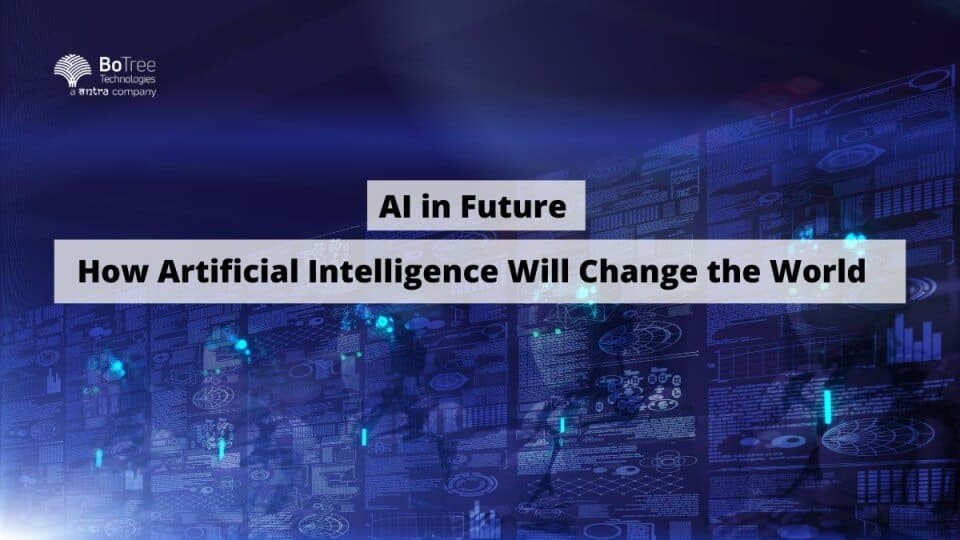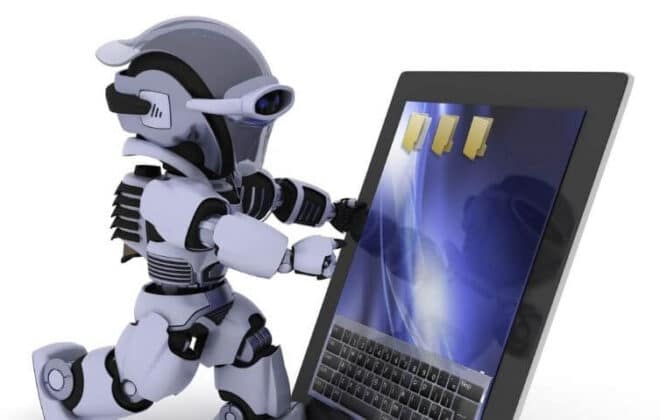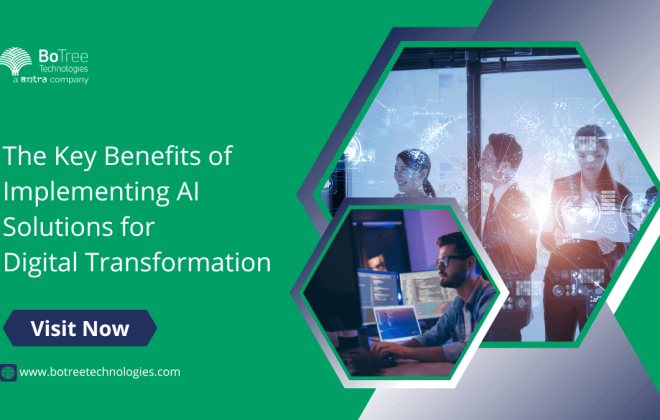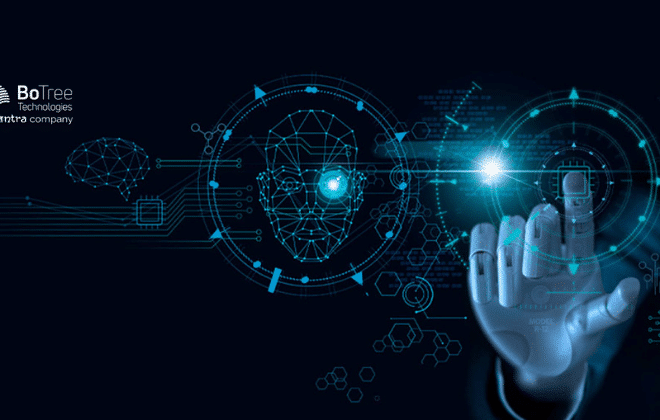
AI in Future: How Artificial Intelligence Will Change the World
Although artificial intelligence has been around since the 1950s, its popularity has skyrocketed in recent years. According to research by Exploding Topics, the AI industry value is projected to increase by over 13x over the next 8 years. AI business solutions have proven to be a boon for almost every industry, from academics to healthcare. AI services are helping businesses to yield better results in less time than before.
Artificial intelligence solution is an advanced computer science, and engineering area focused on creating intelligent agents that can reason, learn, and act autonomously. AI research deals with the question of how to create computers that are capable of intelligent behavior.
In practical terms, applications created by AI developers can be deployed in a number of ways, including:
1. Machine Learning: This is a method of teaching computers to learn from data, without being explicitly programmed.
2. Natural Language Processing: This involves teaching computers to understand human language and respond in a way that is natural for humans.
3. Robotics: This involves the use of robots to carry out tasks that would otherwise be difficult or impossible for humans to do.
4. Predictive Analytics: This is a method of using artificial intelligence to make predictions about future events, trends, and behaviors.
According to various Artificial Intelligence experts, AI is going to shape the future of humanity across every industry very soon.
AI Implementation on Different Industries
1. Healthcare:
Use of artificial intelligence (AI) in healthcare is becoming more widespread as the technology improves and its potential benefits become more clear. AI can be used in a number of ways in healthcare, including assisting with diagnosis, treatment planning, and disease prevention.
There are a number of AI-based applications that are already being used in healthcare, and many more are in development. Some of the most promising applications of AI in healthcare include:
- Diagnosis: AI can help doctors diagnose patients by providing decision support. For example, AI-based systems can be used to analyze medical images or to identify patterns in patient data that may indicate a particular condition.
- Treatment Planning: AI can be used to create individualized treatment plans for patients. For example, AI-based systems can be used to analyze a patient’s medical history and genealogy to identify the best course of treatment.
- Disease Prevention: AI can help prevent disease by identifying risk factors and early warning signs. For example, AI-based systems can be used to monitor a population’s health data to identify trends that may indicate an impending outbreak of a disease.
2. Food Tech:
There’s no doubt that AI Solutions are rapidly transforming the food tech landscape. From automated restaurants to farm management, AI is being leveraged to streamline and optimize food production, distribution, and consumption. Here are a few examples of AI implementation in food tech:
- Automated Restaurants: AI is being used to create fully automated restaurants, where customers can order and pay for their food without interacting with a single human being. While this may sound like a dystopian nightmare to some, the reality is that automated restaurants are already popping up around the world.
- Farm Management: AI is also used to help farmers manage their crops and animals more effectively. By using sensors and data analysis, AI can help farmers optimize everything from irrigation to crop yields.
- Food Delivery: AI is playing a major role in food delivery, as well. Companies like DoorDash and Postmates are using AI to route drivers and optimize delivery times. And, of course, there’s always the specter of self-driving delivery vehicles, which would further reduce the need for human labor in the food delivery process.
- Nutrition: AI is being used to help people make better dietary choices. Apps like Calorie and Fooducate use AI to track users’ eating habits and offer suggestions for healthier alternatives.
- Food waste: AI is also being leveraged to combat food waste. Startups like ReFED are using AI to track food waste throughout the supply chain and develop strategies for reducing it.
3. Retail and eCommerce:
The retail and ecommerce industry is one of the most rapidly growing sectors with the help of technology. The use of artificial intelligence has made a great impact on this industry by providing personalization, predictive analytics, and automated customer service.
Some of the most popular AI applications in retail and ecommerce are chatbots, virtual assistants, and recommendation engines. Chatbots are used to provide customer support and answer questions. Virtual assistants help customers with tasks such as finding products and checking out. Recommendation engines are used to recommend products to customers based on their past purchase history.
The benefits of using AI in retail and ecommerce are vast. By providing personalization, retailers can increase customer satisfaction and loyalty. Predictive analytics can help retailers to forecast demand and make decisions about inventory and pricing. Automated customer service can help to reduce costs and improve efficiency.
Read more: How is Artificial Intelligence Useful in eCommerce?
4. Academics:
The advancement of artificial intelligence has created opportunities for enhancing academic performance through adaptive technology. By providing intelligent tutoring systems that can adapt to the individual needs of a student, AI can offer more personalized and effective instruction. Additionally, AI can be used to create digital assistants that can help with tasks such as scheduling, research, and providing feedback on assignments. As AI technology continues to evolve, the potential for its impact on academia will only grow.
5. Banking and Financial Services:
One area that banks are turning to in order to stay ahead of the curve is artificial intelligence (AI). AI can be used in a number of ways to improve the customer experience, increase operational efficiency, and reduce risk. Here are a few examples of how AI is being used in the banking and financial services industry:
- Automated Customer Service: AI can be used to automate customer service tasks such as answering Frequently Asked Questions (FAQs) and resolving simple customer inquiries. This frees up customer service representatives to handle more complex issues and provides a more efficient experience for customers.
- Fraud Detection: AI helps identify fraudulent activity in real time. By monitoring customer behavior and transactions, AI can flag unusual activity that may be indicative of fraud. This helps banks prevent losses and protect consumers.
- Loan Approval: AI is used to streamline the loan approval process. By using data from credit reports, social media, and other sources, AI can help banks assess a loan applicant’s creditworthiness and make a decision more quickly.
- Personalized Recommendations: AI can be used to provide personalized recommendations to customers based on their individual needs and preferences. For example, a customer who frequently travels for work might be recommended a credit card with no foreign transaction fees. Or, a customer who is trying to save for a down payment on a house might be offered a savings account with a higher interest rate.
- Financial Planning: AI can be used to help customers plan their finances and reach their financial goals. By taking into account a customer’s income, expenses, and financial goals, AI can provide customized recommendations on how to save money, invest, and more.
6. Logistics and Transportation
The logistics and transportation industry is one of the most promising sectors for artificial intelligence (AI) implementation. The benefits of AI implementation in logistics and transportation are plenty, and the industry is already seeing some early success stories.
One of the biggest advantages of AI in logistics is its ability to automate repetitive and time-consuming tasks. For instance, AI can be used to automatically track and update the status of shipments, monitor delivery schedules, and re-route shipments in case of delays. This not only saves time and effort for logistics managers, but also helps to ensure that shipments arrive on time and without any issues.
In addition, AI can also be used to improve customer service in the logistics and transportation industry. For instance, chatbots powered by AI can be used to answer customer queries and provide real-time updates on shipment status. AI can also be used to proactively detect and resolve issues with shipments, before they cause any inconvenience to customers.
Apart from automating and improving existing processes, AI can also be used to develop new and innovative solutions for the logistics and transportation industry by a software development company. For instance, AI can be used to develop better algorithms for route planning and optimize freight operations. AI can also be used to develop new classes of vehicles, such as self-driving trucs, which can further improve the efficiency of the transportation sector.
Read more: Freight Forwarding: Logistic and Transportation App Development Case Study
7. Digital Marketing:
Digital marketing is one of the most important aspects of business in the modern world. The ability to connect with customers and create a relationship is essential to success. Social media, website design, and SEO are all important factors in digital marketing. However, artificial intelligence is quickly becoming one of the most important tools in the digital marketing space.
According to Rahul Vij, CEO at digital marketing agency WebSpero Solutions, “As digital marketing becomes more data-driven and automated, the relationship between AI and digital marketing is becoming stronger day by day.”
There are a number of ways that AI can be used in digital marketing. One of the most important is in the area of customer relationship management. AI can be used to help businesses better understand their customers. This understanding can then be used to create more personalized content and experiences. Additionally, AI can be used to automate customer service tasks. This can free up time for businesses to focus on other areas of their operations.
Another important way that AI can be used in digital marketing is in the area of data analysis. Businesses generate a lot of data. This data can be used to create better marketing campaigns. AI can help businesses to sift through this data and find the most important information. This information can then be used to create more targeted and effective campaigns.
Final Words
AI will definitely change the world in the future. With rapid increase in technological advancements, AI developers at enterprise software development services company are trying to change various sectors including healthcare, finance, automotive and more with AI technology. With AI, various tasks which are difficult for humans to do can be accomplished easily.
Contact us today for a FREE CONSULTATION.




